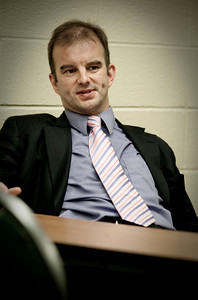Meet Carl Trueman
March 11, 2010

by C.J. Mahaney 1/22/2010 2:31:00 PM
If you haven’t met Carl Trueman you are in for a ride that will take us, well, nobody knows. All we can be certain of is that Bruce Springsteen will likely appear at some point.
Dr. Trueman’s official title is Professor of Historical Theology and Church History at Westminster Theological Seminary in Philadelphia. He describes himself as a British round peg jammed into an American square hole.
He has written, contributed to, or edited a library of books. He is also the author of many “critical writings” and “unpopular essays” that appear online and have been published in two books: The Wages of Spin: Critical Writings on Historic and Contemporary Evangelicalism (2005) and Minority Report: Unpopular Essays on Everything from Ancient Christianity to Zen Calvinism (2007).
You can keep up with his most recent essays at the Alliance of Confessing Evangelicals website here.
In his essays Carl teaches lessons from history and pokes a bit at the evangelical church’s fondness for therapeutic leanings, entertainment, celebrity culture, and flippancy. And he stabs away with one index finger tap at a time. Carl writes:
I take some perverse pride in the fact that I can only type with one finger on each hand, romantically seeing this lack of polish as making me the modern equivalent of the 1930s hack journalist, cigarette hanging from the corner of his mouth, glass of bourbon on the bedside table, hammering out copy on an old typewriter in a dingy motel room.
That’s Carl. And with quotes like this we can be certain that 200 years from now there will be a Carl Trueman Society where enthusiasts gather to exchange favorite lines and lament that they could not meet the man in person. This interview is for them.
Meet Carl Trueman.
Carl, thanks for your time. Please describe your morning devotions. What time do you wake up in the morning? How much time do you spend reading, meditating, praying, etc.? What are you presently reading?
My children have to be at school by 7:30, so I rise at about 6:15 to 6:30. I usually wait until I arrive at work, ca. 8 a.m., to have devotions. Westminster offices do not open till 8:30 so this gives me a half hour of peace and quiet. I typically read four chapters of the Bible. I read continually from Genesis to 2 Chronicles; from Ezra to Malachi (excluding the Psalms); from Matthew to Acts; and from Romans to Revelation; I finish with a Psalm or two, reading continually through the Psalter. At this precise moment, I am in Numbers, Job, John, and 1 Corinthians, with the daily Psalm being 143. Prayer then involves adoration, confession, thanksgiving, and supplication. The simple ACTS pattern that I learned at college.
What book(s) are you currently reading in these three categories: (a) for your soul, (b) for pastoral ministry, or (c) for personal enjoyment?
(a) I have recently reread Pilgrim’s Progress. A brilliant, deceptively simple masterpiece whose characters never cease to amuse and provoke. I’m also about to start Tom Schreiner’s Magnifying God in Christ: A Summary of New Testament Theology, just released by Baker.
(b) Pastoral Theology in the Classical Tradition by Andrew Purves. A student recommended this book to me after a class I gave on the pastoral manuals written by John Chrysostom and Gregory the Great. It is a study of these men, plus Gregory Nazianzus, Martin Bucer, and Richard Baxter, as they reflected on the task of being a pastor. Much that they have to say (for example, how to handle criticism) is of perennial relevance; and they also focus on what is of lasting significance in the ministerial task, not the kind of managerial/consumerist impulses which drive much pastoral theory today.
(c) Ian Ker’s biography of John Henry Newman, Fergus Kerr’s Twentieth-Century Catholic Theologians and Ruth Rendell’s Portobello (I’m a sucker for hard-boiled and psychological crime fiction—anything by Raymond Chandler, Ian Rankin or Ruth Rendell).
Apart from Scripture, what book do you most frequently re-read and why?
This is easier to answer in terms of authors: I constantly dip into Martin Luther’s writings; I appreciate James Packer’s books; I enjoy John Henry Newman’s writings, especially his sermons; and I find the great creeds and catechisms of the church to be a great source of delight—they keep my faith simple, focused on the essentials, and in touch with the church throughout the ages.
When you finish a book, what system have you developed in order to remember and reference that book in the future?
Generally, I read with a pencil in hand and underline key passages. Never a pen, mind you—that would be too permanent and spoil it for whoever owns the book next. I also carry a moleskine notebook with me to make any extended notes on a given book, and, indeed, on any conversation or thing I see or hear that may be useful. I chose moleskine because I gather that Ernest Hemingway used them. A vain indulgence, I’m afraid. I also keep a daily journal where, if a book is particularly important or insightful, I will make note.
READ THE WHOLE INTERVIEW...







